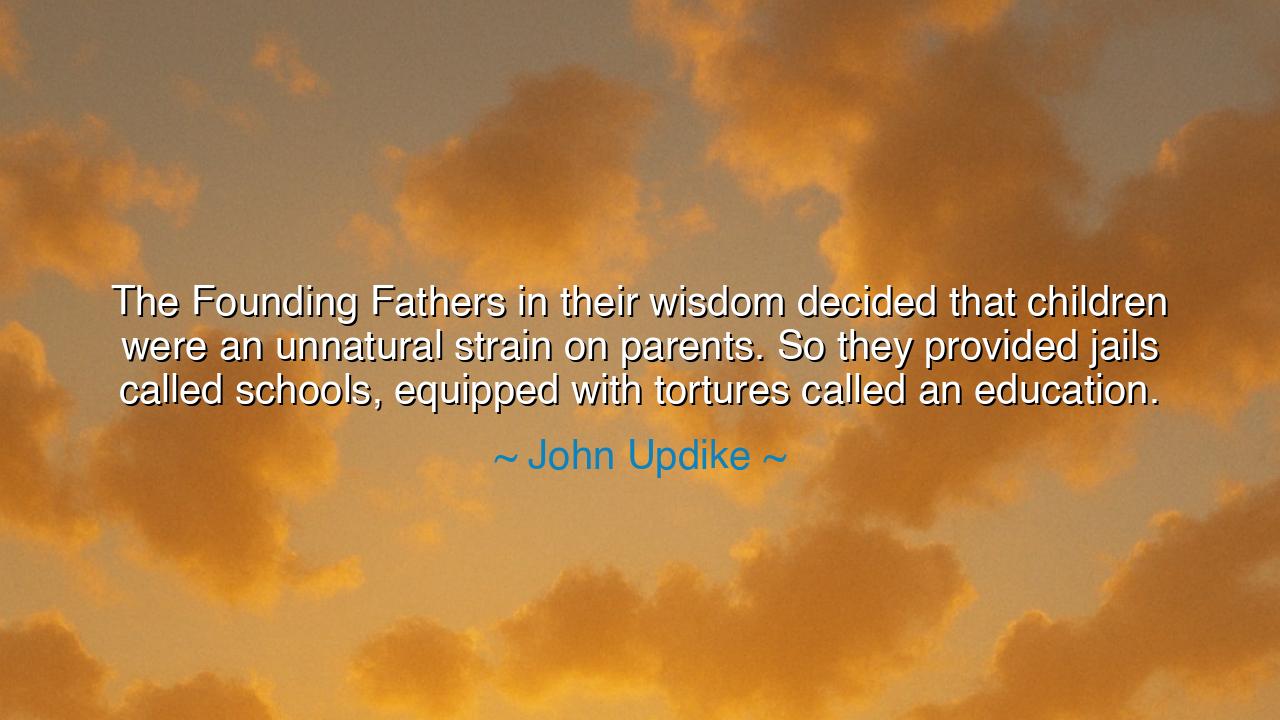
The Founding Fathers in their wisdom decided that children were
The Founding Fathers in their wisdom decided that children were an unnatural strain on parents. So they provided jails called schools, equipped with tortures called an education.






The novelist and satirist John Updike, with the tongue of jest but the edge of truth, once declared: “The Founding Fathers in their wisdom decided that children were an unnatural strain on parents. So they provided jails called schools, equipped with tortures called an education.” Behind this irony lies a sharp meditation on the burdens of raising the young, and on the strange, often harsh design of education. He speaks of schools as prisons not to condemn learning itself, but to unveil the discipline, the confinement, and the struggle that often mark the journey from childhood to maturity.
The origin of this thought springs from Updike’s gift of blending humor with critique. He mocks the Founding Fathers, suggesting they devised schools as a relief for parents rather than a gift for children. Yet within the jest lies a serious truth: that society must channel the wildness of youth, binding their restless spirits with rules, schedules, and lessons. To the child, this feels like torture; to the parent, it feels like necessity; to the state, it feels like order. Thus, Updike reminds us that what we call education is often as much about discipline as it is about enlightenment.
History offers countless witnesses to this paradox. In the Spartan agoge, young boys were taken from their homes and subjected to rigorous training in hardship, endurance, and obedience. To them, it must have felt like a jail, filled with tortures, yet it produced soldiers feared across the world. Similarly, the medieval monastery schools demanded silence, repetition, and strict discipline from their pupils, forging both scholars and saints. Here we see how the pain of education was inseparable from its fruit.
The ancients themselves knew this duality. Plato in his Republic argued that children must be guided firmly, shielded from corrupting tales, and shaped toward virtue. To the young, this shaping may feel oppressive; to the wise, it is the molding of souls into harmony with the good. Even the Proverbs declare, “The rod of correction imparts wisdom.” Thus, education, though harsh, was seen as the necessary forge of wisdom.
Therefore, O seekers, heed the jest but learn the truth within it. Schools may feel like prisons, and education like torment, but from such discipline springs the strength of mind and heart needed to face the world. The chains of study, though heavy in youth, break open into the freedom of knowledge in maturity. Let not the complaint of the child blind you to the purpose of the parent or the vision of the lawgiver. For though the process may resemble confinement, its end is liberty—the liberty that only wisdom can bring.






DHNguyen Van Duc Hau
I’m curious about how this satirical critique intersects with social equity. If schools are designed more to manage children than nurture them, who benefits most from the system, and who suffers? Could this critique explain persistent inequalities in educational outcomes, particularly for marginalized communities? I’d like to explore ways education could be reimagined to truly serve both children’s growth and societal needs.
KCkatakuri Cl4
I find myself reflecting on the metaphorical language here. Calling schools 'jails' and education 'torture' is striking. How much of our current educational system still feels punitive rather than empowering? Are standardized testing, rigid curricula, and crowded classrooms perpetuating the negative dynamics Updike critiques? I’d like perspectives on ways to humanize education while still maintaining structure and accountability.
HTNguyen Huyen Trang
This quote raises questions about authority and parental responsibility. If schools were initially seen as a relief from the burden of child-rearing, does that suggest a tension between public and private roles in education? How do cultural attitudes toward parenting and institutional learning shape the way children perceive authority and learning? I’d like to explore whether these dynamics differ across countries or historical periods.
TDnguyen the dung
I feel a mix of amusement and frustration reading this. Could the satirical tone obscure a serious critique about how society views children and responsibility? Are schools inadvertently teaching children to conform rather than to think independently? I’m curious about the balance between societal needs for educated citizens and individual rights to autonomy, creativity, and well-being during formative years.
AHVan Anh Hoang
This makes me wonder about the psychological impact of traditional schooling. If children are subjected to rigid structures and punishments, does that foster long-term learning or just compliance? How might the experience of education differ if it were designed around intrinsic motivation rather than obligation? I’d like a perspective on whether alternative educational models like Montessori or democratic schools truly address the concerns Updike satirizes.